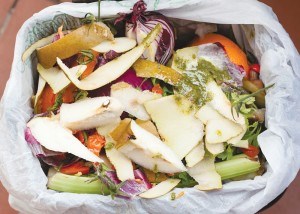
The community of Jasper managed to divert just over a third of its waste from the landfill last year, but Janet Cooper, the town’s environmental stewardship coordinator, believes residents can do better.
“Our diversion rate has hovered around 30 per cent over the past few years,” said Cooper. “It’s disappointing to see it stay consistent because you want to see the diversion rate increase.”
According to her annual report, Jasper’s waste diversion rate increased to 34 per cent in 2015, five per cent more than the previous year.
“You have to take that with a grain of salt,” said Cooper, about the diversion rate, which is measured in metric tonnes.
She said the diversion rate is only one indicator of the town’s overall success, but does not provide the entire picture because it is strongly influenced by weight.
For example, over the past year the community diverted 428 metric tonnes of beverage containers, about 82 more tonnes than the previous year, but because plastic is a lightweight material it does not affect the overall diversion rate as much as organic material.
To increase the amount of waste that is diverted from landfills, Cooper said she would like to see more people and businesses separate their kitchen organics from their garbage.
“It’s stayed very steady over the last four years, which means the people who are separating out organics continue to do so and the ones who aren’t doing it haven’t jumped on board,” said Cooper.
“It’s a voluntary program and we just have to work towards making it the norm when you’re cooking your food or preparing your dinner that you have a separate bin for your organics.”
In recent years the municipality has tried to make it easier for people to get rid of their organics by pairing street side compost bins with garbage bins.
“If every household started to use them it would be a significant increase,” said Cooper, referring to the amount of waste that would be diverted from the landfill.
According to the report, the community diverted nearly 380 metric tonnes of kitchen organics in 2015, 15 metric tonnes less than the previous year.
Cooper said food waste constitutes approximately 40 per cent of residential waste and said it’s even higher for restaurants.
“If every restaurant did a good job separating out their organics it would make a huge difference in our organic collection,” said Cooper.
“We pay at the scale at the landfill, so everything you can do to reduce the weight going into the landfill reduces total costs,” explained Cooper.
“Now that Jasper is a member of the West Yellowhead Regional Waste Authority we have a vested interest in that landfill and developing new cells in a landfill is hugely expensive so if you can cut waste coming in by half and double the life of your landfill it saves every taxpayer money.”
In 2015, the town shipped nearly 4,649 metric tonnes of waste to the regional landfill, about 512 tonnes less than the previous year.
She said she was a bit surprised by that because of the sharp increase in the number of visitors and the fact that construction of the high school produced 725 metric tonnes of waste in 2014.
On a positive note, the community recycled 480 metric tonnes of cardboard in 2015, nearly 105 more tonnes than the previous year.
“Our cardboard is probably our most successful recycling program,” said Cooper.
“We send so much cardboard out of here it’s impressive,” she said, adding the market price for cardboard fluctuated between $36 and $98 a metric tonne in 2015.
The amount of mixed plastic being diverted from the landfill has also been steadily increasing over the past few years, hitting nearly 18.5 metric tonnes in 2015, up from just over 13 metric tonnes in 2013.
In an effort to increase diversion rates, Cooper will be working on improving recycling at campgrounds this summer, among other initiatives.
The environmental stewardship program is a collaborative effort between the municipality and Parks Canada to make Jasper a more sustainable community.
Paul Clarke
[email protected]
